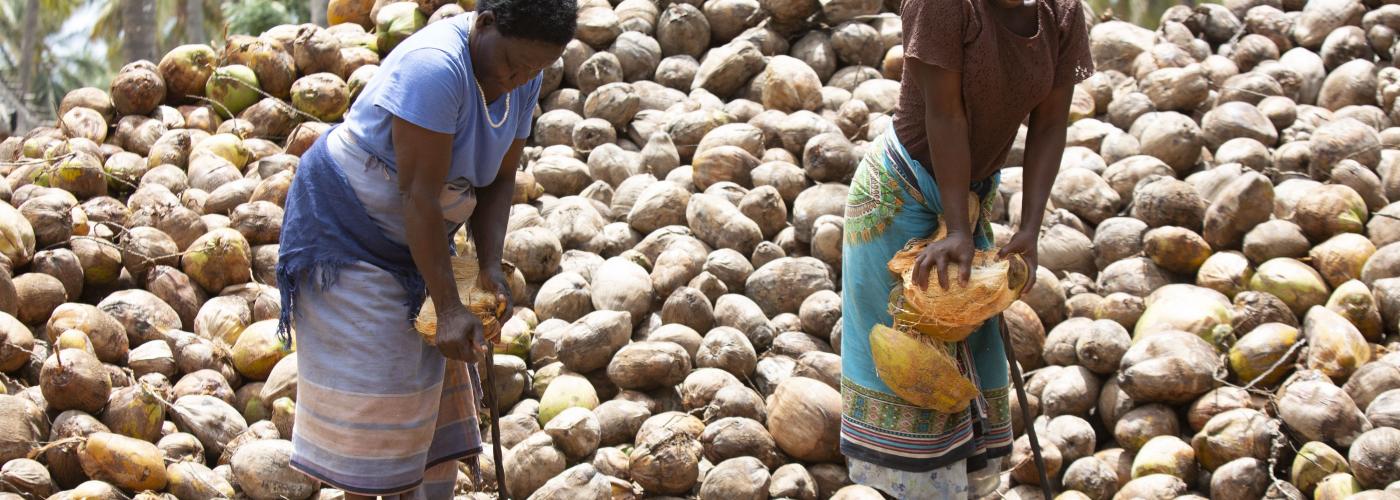Kenyan Coconut Enterprise Tries Out New Recipe: Gender Equity
Image

By Carolanne Chanik, INVEST Communications Coordinator
About an hour drive outside of the port city of Mombasa lies the coastal town of Ukunda, a modest road stop on the way to Kenya’s Diani Beach. On the outskirts of Ukunda are a smattering of general stores and auto repair shops to serve motorists and day travelers, and a coconut processing plant owned by Kentaste Products Limited.
Kentaste is Kenya’s leading manufacturer of coconut-based products, specializing in producing coconut milk, cream, and all-natural virgin coconut oil. They sell their products in 400 stores across Kenya and 500 stores across East Africa. Kentaste’s Ukunda factory processes 30,000 coconuts a day, sourcing their coconuts from farmers along Kenya’s coastline, from the Tanzanian border up to the town of Malindi in the north. It employs almost 200 permanent staff members, 27% of which are women, and works with 2,000 certified Fair Trade and Organic small holder farmers, 21% of which are women.
“We believe in local opportunities for local people,” explains Kyle Denning, CEO of Kentaste. “Our relationships with our suppliers and our plant workers have been essential to the success of our business.”
However, Denning realizes that not all people have equal access to the opportunities that Kentaste offers.
Across the globe, the gender equality gap persists and is especially pronounced in Kenya’s rural communities. Women are often expected to prioritize their responsibilities at home over obtaining paid employment. Standard working hours pose a challenge for women with childcare responsibilities, and new or expectant mothers often risk losing their positions by asking for extended time off. Misinformation about job requirements can lead women to believe they’re incapable of meeting the physical demands of many jobs in the formal economy, such as processing coconuts.
“Women think they can’t do the work, so they don’t. We need to show them that they can,” says Monica Njoroge, Kentaste’s Human Resources Manager.
USAID’s Office of Gender Equality and Women’s Empowerment aims to increase women’s entrepreneurship and economic empowerment by helping companies like Kentaste access customized gender-smart technical assistance and implement best practices for incorporating gender inclusion across their business model.
USAID’s hypothesis is that investing for gender equity will result in increased profits, return on investments, and positive humanitarian results and that the best way to increase the flow of capital into gender-smart businesses is to increase the use and quality of gender-lens investing (GLI) strategies among investors and their portfolio companies. (Gender-lens investing, as it’s been defined by the Gender-Smart Investing Summit and Criterion Institute, refers to the use of capital to simultaneously improve gender equality and business returns.)
USAID, via the INVEST initiative, is currently working with the AlphaMundi Foundation to provide gender-smart support to Kentaste and eight other small and medium-sized enterprises (SMEs) located in Latin America and East Africa. Coupling investment with targeted technical assistance to the private sector is shaping up to be an important means for enhancing impact and allowing more firms to participate in investment deals with gender-focused objectives. INVEST is researching the best means to maximize these benefits through the support of firm level technical assistance both before and after transaction close.
Partnering with Value for Women, a specialized advisory firm that helps organizations advance gender inclusion, AlphaMundi Foundation is helping these SMEs identify gender-smart solutions to their business challenges, building an evidence base for gender-smart investing, and making the future for women workers and farmers on Kenya’s southern coast a little sweeter.
Beyond a Niche Strategy: Applying Gender-Smart Technical Assistance Broadly
In 2016, AlphaMundi Group, an impact investing firm that provides financing to social enterprises in emerging markets, established the AlphaMundi Foundation, a sister nonprofit that raises capital to provide the Group’s portfolio of SMEs with pre- and post-investment technical assistance. In 2018, AlphaMundi Group began formally integrating gender analysis in its investment and due diligence process and discussing a company’s willingness to incorporate gender-smart practices across its business model as a prerequisite for receiving subsidized support.
“We want to empower women across the value chain of our portfolio companies,” says Lisa Willems, Managing Director of the AlphaMundi Group and Foundation. “That’s a broader task than simply supporting women-led or women-owned businesses.”
These two organizations are building the data-backed business case for GLI. While many organizations working on gender-lens approaches only work with women-owned or women-focused companies, AlphaMundi finds that approach too limiting. Doing so would discount a large swath of companies that could benefit, both financially and socially, from making gender considerations a core principle of their business model. By working with a wider variety of companies, AlphaMundi has the chance to improve the lives of more women and push women up through the ranks of a corporate structure.
In early 2020, the AlphaMundi Foundation began its work with INVEST by strategically taking a ‘funnel’ approach to screen 30 of AlphaMundi Group’s portfolio companies and select nine investees to receive gender-smart technical assistance. This ‘funnel’ took into account a company’s financial viability, bandwidth, and the tenure of their relationship with the AlphaMundi Group.
“We ensured our nine participants would be the best companies for this project not only because of their firm financial footing but also because they have bought in to the importance of gender considerations,” says Christine Roddy, AlphaMundi Foundation’s Executive Director. “The Kentaste team was bought in from the start.”
Scaling Gender-Smart Practices: Meet Businesses Where They Are
“Had we considered gender balanced business practices before AlphaMundi approached us? No, not really,” says Kentaste’s Denning. “We recognized the value and impact of a gender balance, but it was more of an observation than a formal policy or practice.”
Kentaste’s passive approach to gender balance is not an uncommon one. “Businesses tend to be aware of why it’s important to include gender in their work, but it’s the how that trips them up,” explains Stephanie Finigan, Director of Programs at Value for Women. “And that’s where our work focuses. Most firms think “human resources” when they think about gender-smart policies, but there’s a lot more to it than that. Our job is to help them see that looking at gender across their business might be a broader view than what they’re used to — meaning that we might move beyond the HR realm.”
Having already worked on several projects with Value for Women, Roddy and her team knew the advisory firm would be the right partner for the job. Value for Women kicked off their support to Kentaste through their proprietary Gender and Business Diagnostic — a comprehensive process that assesses a company’s current gender inclusion practices, formalized processes and commitment to gender equality, the gender composition at different levels of a company’s value chain, and areas of strength and opportunities for growth.
“We want their path forward to be informed by practices that make sense for them as a business,” says Finigan.
Based on their findings, Value for Women provided Kentaste with a menu of options for improving their business practices and assisted the company in designing a work plan. This plan includes:
- Carrying out a market study to better understand the needs of women coconut suppliers,
- Developing a formal gender commitment statement,
- Conducting a detailed HR review to foster a workplace culture that ensures equitable opportunities for women throughout recruitment, retention, and progression in the company, and
- Drafting Kentaste’s sexual harassment policy.
Eight months into implementation, initial progress has been positive and Kentaste has been receptive towards making their working environment one in which all parties can thrive. For instance, Value for Women’s Employee Satisfaction and Organizational Culture survey showed that Kentaste’s women employees wanted a safer workplace that took their family needs into account. So, in addition to implementing the work plan co-designed with Value for Women, Kentaste is also in the process of using a grant from Acumen, a co-investor, to revamp its processing plant to include a nursing room, daycare facility, and a women’s locker room to provide a safe changing area. The company is also looking into a shift schedule that would better align with school hours, enabling working mothers to pick up their children at the end of the workday.
Kentaste’s team hopes that these steps will add up to improved gender equality at the processing plant, more equal opportunities for employment, and increased staff retention.
“I would want to work at a place like that,” says Asya Troychansky, Gender and Business Advisor at Value for Women. “These types of changes can lead to employee retention and motivate new employees to join. That right there is a return on investment.”
With these formalized measures in place, the company expects to have some notable impacts on their business, suppliers, and workforce by the end of 2021.
“This opportunity has opened our eyes to the impact something can have when you buckle down and make it a priority,” says Denning. “This work has allowed us to do that. It’s encouraged us by providing us with a reason and resources, and the Value for Women team helped us to realize the return on investment, both commercial and social, that comes from this effort.”
“There are still societal structures in place that prevent gender balance in the workforce,” adds Kentaste’s Njoroge, “but we believe it’s important to continue pushing that boundary.”
Overcoming Barriers to Gender-Lens Investing
There’s no shortage of information around the economic and social advantages of enabling women in the workforce, so why aren’t more SMEs trying to actualize these changes on their own?
For starters, the day-to-day management of an SME operating in an emerging economy comes with many competing priorities. Adding yet another element to business management can seem overwhelming for a CEO.
“In a developing economy, managing revenue, hitting investor targets, bringing in new technology, and teaching local staff how to manage and operate a business at a high level takes up most of your time and effort,” explains Denning.
“That’s where the importance of our case building comes in,” says Willems of AlphaMundi. We’re building evidence to show companies that incorporating these practices not only improves the lives of women but also gives the company a better ROI with less staff attrition, so it’s worth their time and effort.”
Through this work with INVEST, AlphaMundi and Value for Women aim to contribute to the growing base of evidence that shows gender-lens investing is smart investing and stops funders from continuing to question its validity. Development agencies such as USAID have played an important role in enabling AlphaMundi and other actors in the GLI field to prove this case. According to Willems, these public dollars pave the way for private dollars, which are always a bit slower to follow.
“Investing with a gender lens, investing into companies with gender diversity that embody these business-first, gender smart principles, is just better business,” she says. “Thankfully, under USAID and INVEST, we have a nice runway for this work. We’ve been gifted time to do this the right way.”


